Why boric acid is useful for cucumbers and how to use it correctly
For healthy growth, timely flowering and fruiting, cucumbers need warmth, moisture, nutritious soil and a balance of microelements.
The article is devoted to one of the most important elements in the life of plants - boron and its biologically assimilable compound - boric acid. Why you need to treat vegetables with boric acid and how to carry out the procedure correctly, read below.
The effect of boric acid on cucumbers
Boron ions are contained in the soil in negligible quantities and are less than a part per million. However, the full development of cucumbers without this element is impossible.
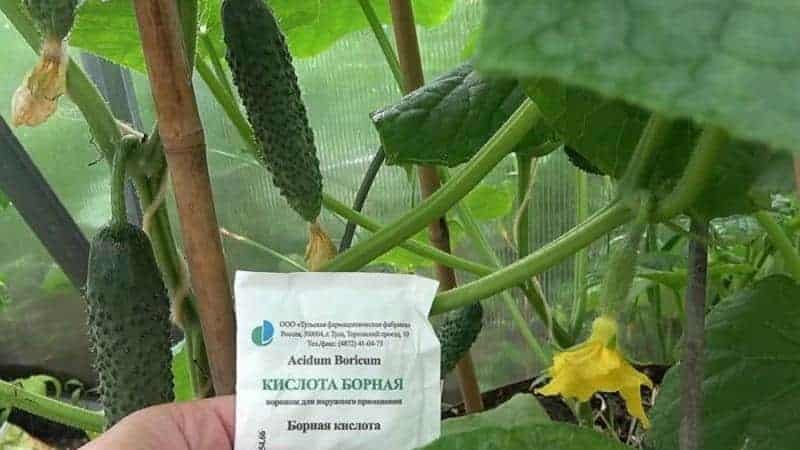
The most accessible source of water-soluble and bioavailable boron Boric acid is used. It can be easily purchased in powder form at a pharmacy.
Reference. Almost all boron-containing fertilizers are produced on the basis of boric acid.
The role of boron in development and growth
Boron plays an important role in the processes of vegetation, flowering and fruiting. The main function of this element is to strengthen and maintain the integrity of cell membranes.
Bohr is also involved in:
- carbohydrate metabolism and transfer of sugars across membranes;
- synthesis of phytohormones and nucleic acids;
- regulation of the content of ionized calcium necessary for cell growth;
- respiration of plants.
Benefit
The effect of proper fertilizing with boric acid manifests itself quickly:
- the development of the root system improves;
- the intensity of flowering and the number of ovaries increases;
- the taste of cucumber increases due to increased metabolism of sugars;
- Plant resistance to adverse weather conditions, pests and diseases increases.
When to process
For cucumbers, it is not the total boron content in the soil that is important, and water-soluble accessible compounds. Boron should be added at the first signs of deficiency.
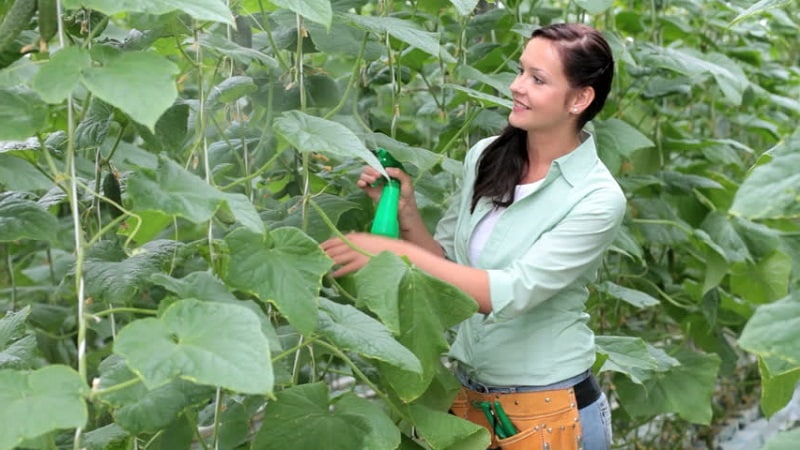
Experienced summer residents do not recommend fertilizing with boron-containing preparations for future use.. An excess of the element leads to intoxication and in some cases to the death of plants.
Signs of boron deficiency
Boron deficiency is typical for soils with high alkalinity (limestone, carbonate). The primary symptoms of boron deficiency appear at the cellular level. The cell walls thicken, the content of pectin substances increases.
Microelement deficiency is signaled:
- inhibition of growth points, dwarfism;
- slow pollen maturation and reduction in the number of ovaries;
- falling of buds and ovaries;
- crooked, bent cucumbers with low taste;
- shortened internodes;
- fragility and death of side shoots;
- underdeveloped root system with thickenings at the ends of the roots.
Read also:
Why is it necessary to treat cucumbers with brilliant green and the rules for its implementation
Symptoms of excess boron
At concentrations in soil greater than 1.0 ppm, boron becomes toxic to plants.. The substance primarily accumulates in the foliage, causing a kind of burn. The productivity of cucumber bushes is reduced.
An overdose of boron can be determined by the following signs::
- growth retardation;
- marginal necrosis and curling of leaf blades;
- dome-shaped leaves;
- lemon-yellow color of leaves with foci of necrosis between the veins;
- leaf fall.
Application at different stages of development
Boric acid treatments for cucumbers are useful starting from germination from seed and ending with the fruiting period.
Before sowing
Soaking seeds in boric acid solutions improves germination, additionally disinfects and saturates with nutrients. After pickling, the cucumber seeds are placed in the drug solution for about 12 hours. To prevent the seeds from floating, they are wrapped in gauze.
The soaking liquid is prepared dissolving 0.2 g of boric acid powder in 1 liter of hot water. The resulting mixture is cooled and used for its intended purpose.
When growing seedlings
Cucumber seedlings are sprayed after transplanting into the ground. Use approximately 30 ml of solution per sprout. This procedure helps the sprout take root better and improves immunity.
Can be processed also grown without seedlings bushes at the stage of 4-5 true leaves.
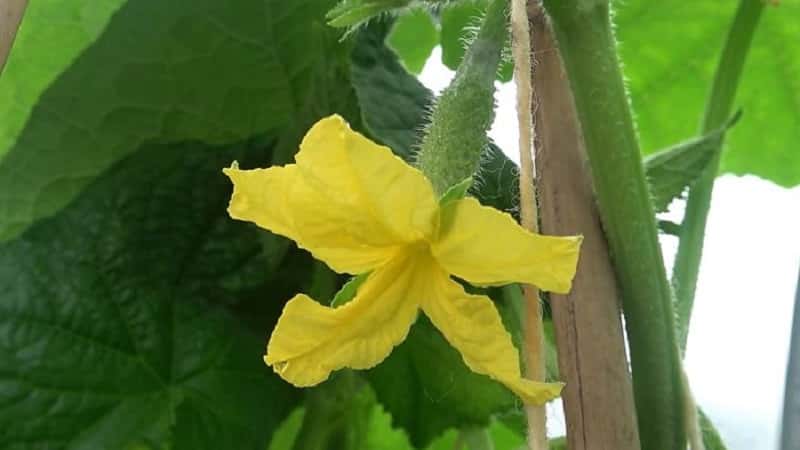
During the flowering and fruiting period
Boron becomes especially important during the flowering period., laying and pouring fruits.
Fertilizing with boric acid increases plant immunity. Without harming fruiting, cucumbers tolerate short-term lack of moisture or a sharp drop in temperature. Cucumbers acquire sweetness and aroma.
It can be useful:
How to prepare the solution correctly
It is not difficult to prepare a solution of boric acid; the main thing is not to make a mistake with the dosage. For any type of plant nutrition, use only powder, under no circumstances should it be an alcohol solution.
Important! The use of solutions with high concentrations leads to leaf burns.
The substance is poorly soluble in cold water. The powder is first diluted in a small amount of hot (50-70ºС) water, and then brought to the required volume with cold water. The resulting liquid is used immediately.
Solution proportions
Optimal concentration of boric acid solution - 5 g (1 level teaspoon) per 10 liters of water. If less product is required, take 0.5 g of powder for each liter of water.
Recipes with various additives
Additives enhance the positive effects of the solution boric acid on cucumbers.
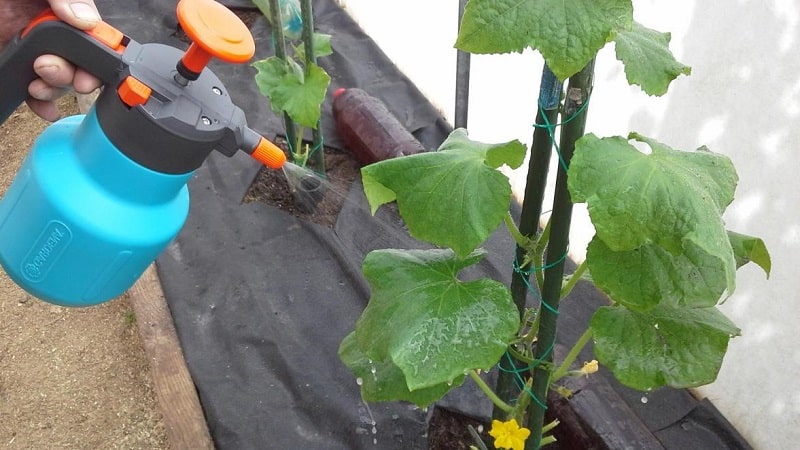
The table shows several recipes from experienced gardeners.
| № | How to cook | Result | Dosage and method of administration |
| 1. | 0.5 tsp. dissolve boric acid powder in a glass of hot water, pour into a bucket of cold water, add 2 tbsp. l. ammonia and several crystals of potassium permanganate. | Stimulation of flowering and fruit formation. Destruction of aphids and pathogenic bacteria. | Spray 50 ml per bush during budding. |
| 2. | Dilute 1.5 g of boric acid and several crystals of potassium permanganate in 200 ml of hot water. Pour the mixture into a glass of milk and add 60 drops of iodine and 1 tbsp. l. urea. Bring the volume of liquid to 10 liters with cold water. | Acceleration of growth of leaf mass and ovaries. Increased immunity to fungal infections. | Spray at the beginning of flowering and during fruiting with about 100 ml per 1 m². |
| 3. | 0.5 tsp. dilute acids in 10 liters of water, add 200 ml of chlorella suspension diluted with 1 liter of warm water. | Increasing the vitality of plants, preventing fungal and bacterial infections. | Treat one leaf at a time during flowering and fruit formation, 50 ml per plant. |
| 4. | 1 tsp.dissolve the powder in 10 liters of warm water, add 100 g of honey or sugar. | Attracting bees for pollination. | Spray on flowering cucumbers in open ground at the rate of 100 ml per 1 m². |
How to process
Available forms of boron in soils are represented by boric acid and its water-soluble salts. These compounds are weakly fixed in the soil and are easily washed out by precipitation. For this reason, fertilizing with boric acid is carried out on the leaf.
During the season, it is enough to treat the cucumber plantings with boric acid 3 times.: when buds appear, during the flowering period and during mass fruit set.
When feeding plants with a solution, you must adhere to two rules:
- spray cucumber beds in calm, dry weather, early in the morning or in the evening;
- When spraying, evenly moisten the entire surface of the sheet with the solution.
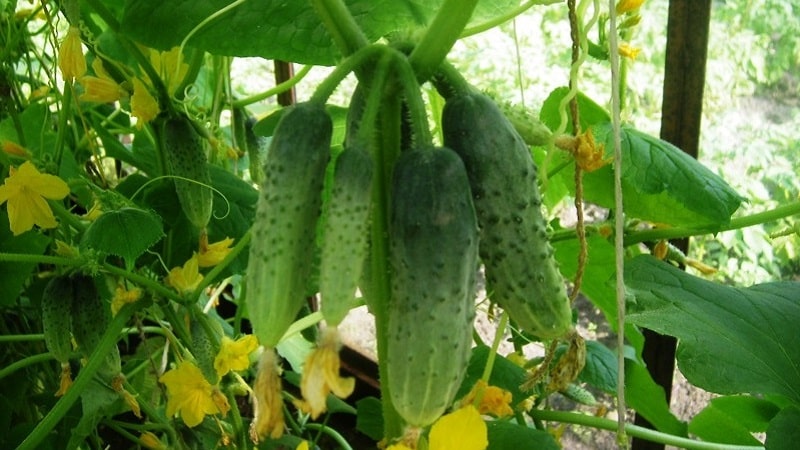
Tips and tricks
Some tips from summer residents on the use of boric acid:
- Boric acid powder will help get rid of house ants. It is necessary to scatter the drug in those places where insects most often appear: behind baseboards, near the trash can, under kitchen cabinets. For a better effect, you can mix the acid with sugar or jam.
- A solution of boric acid can be used to treat not only cucumbers, but also tomatoes, potatoes, cabbage and other vegetables.
- If you treat strawberries with a standard boric acid solution twice a season, the berries will be sweeter.
Conclusion
Boric acid is an essential source of boron, which is necessary for the proper growth and fruiting of cucumbers. The drug is available and inexpensive. Summer residents use foliar feeding with this substance. It is recommended to spray three times during the flowering and fruiting period.
If you follow all recommendations for dosage and methods of use, the substance is safe for humans and plants.